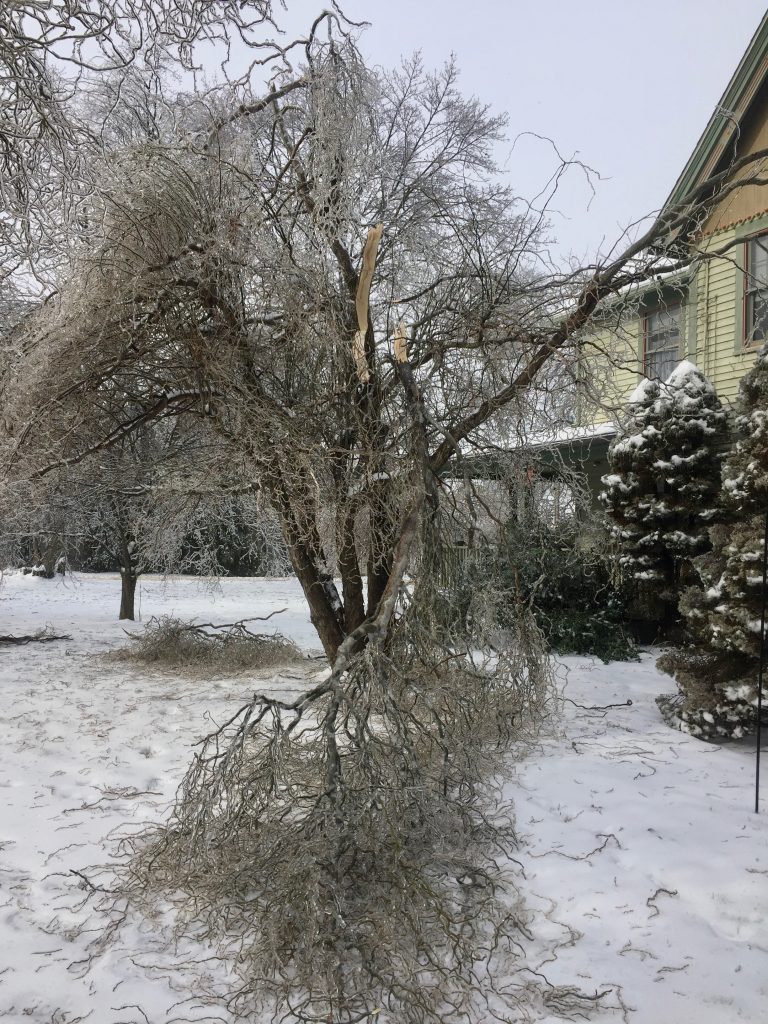
On this day when many of us seek to honor the life and legacy of Rev. Dr. Martin Luther King, Jr., the image of the corkscrew willow in our side yard haunts me. Fragile, frozen, fractured, fallen are its limbs, not unlike the limbs of the body of this nation, not unlike the soul of this creature we dare to call homo sapiens. How imbued with wisdom are we? How committed are we to making a moral dent in the immoral practices of this time that is ours to share—a mere nanosecond in time itself, a mere wonderment that we occupy even this nanosecond?
This morning I had planned to attend the Rev. Dr. Martin Luther King, Jr./Alfred Owens Scholarship Breakfast in Meriden, the venue of the Unitarian Universalist Church in Meriden, where I am amid the seventh and final year of my professional ministry. Mama Nature had other plans. While I don’t believe she micro-manages, the doors to my means of getting there were frozen shut. Ergo, I seek to connect with you through my reflections from home.
No, I’m not old enough to have been alive on January 15, 1929—90 years ago—when Dr. King joined this world in Atlanta, Georgia. I do remember well April 4, 1968, hearing the heart-wrenching news that Dr. King was assassinated that morning while taking a breath of air on the balcony of the Lorraine Motel in Memphis, where he had offered up that now iconic speech the night before on behalf of striking sanitation workers. It was just two months after my first husband was killed in the War in Viet Nam, a war that I strongly protested. I was in my apartment on East 3rd Street in New York City, sewing a dress—mundane, yes?—and finishing my final studies at Union Theological Seminary.
What in God’s name did the plight of sanitation workers have to do with Dr. King as the more or less leader of the mid-20th century civil rights movement? Intersectionality is the new term for linked oppressions. There is nothing new about it. Dr. King understood this well. In his speech at Riverside Church a year to the day before his death, he called out this nation’s leaders on their policies and practices in Viet Nam, the venue of my pilgrimage for truth, reconciliation, and healing this past November. But he went further:
“The war in Vietnam is but a symptom of a far deeper malady within the American spirit… Such thoughts take us beyond Vietnam, but not beyond our calling as sons of the living God.”
Dr. King called for a revolution of values in this nation and in our world, a prophetic precursor to the proclamation of Rev. Dr. William Barber, who frames the current betrayal of love in this nation as a moral crisis, “a heart problem”. Like Dr. King, Dr. Barber addresses the woven nature of oppressions. Across time, the bulging receptacle of racism, classism, homophobia, transphobia, sexism, economic greed, and national hubris holds transgressions that are woven.
When Dr. King went back to Memphis (for he had been there before, countering the powers that be in that city), he knew in the bones of his soul the peril held in the promise of this journey.
“I don’t know what will happen now. We’ve got some difficult days ahead. But it doesn’t matter with me now. Because I’ve been to the mountaintop. …And I’ve seen the promised land. I may not get there with you. But I want you to know tonight, that we, as a people, will get to the promised land. And I’m happy, tonight. I’m not worried about anything. I’m not fearing any man. Mine eyes have seen the glory of the coming of the Lord.”Dr. Michelle Alexander is one of my great heroes and a Visiting Professor at Union Theological Seminary, my alma matter that holds much of my own history. In yesterday’s New York Times, (January 20, 2019), Dr. Alexander, like Dr. King before her, directed her fierce and fearless voice to the intersectionality of the moral challenge of this nation, from the War in Viet Nam (the American War, as aptly termed by the Vietnamese), to the moral challenge of this nation’s unquestioning support for the policies and practices of Israel vis-a-vis the human rights of Palestinians. Like Dr. King’s challenge to the immoral economics of this nation in 1968, Dr. Alexander’s challenge to the immoral collusion with a nation that has become “our ally”, no matter how oppressive their tactics against those whose land they have mapped out as theirs, carries a high risk. Might we see through the charges of anti-Semitism that immediately greet any questioning of Israeli policy and call to task injustice wherever and by whomever wields it, most especially our own nation in this slice of history through which we are moving.
Above all today, I wonder how we deem spirituality. There are folks who have left the congregation that I serve as minister because they deem my ministry “too political”, “not sufficiently spiritual”. “Oh my God,” I say prayerfully and otherwise. How might we affirm that morality and compassion are as much the language of spirit as they are of how we structure ourselves in society—i.e. politics? Politics isn’t partisanship. Recognizing the evil in the oval and adjoining offices isn’t partisanship. On this day of presuming to hold up the life and legacy of Dr. King, might we recognize and bear witness that the “love beyond belief”, which some of us claim as our theological ground, calls us to act on the reality that if all life is connected, all oppressions are woven. Our calling, my calling, is to speak from the bones of our souls in language that walks and marches and sometimes screams to the powers that be, “Enough! It is time to be and do into the fullness of love’s promise and peril. It is time for a resurrection and revolution of values that go beyond Viet Nam, beyond Memphis, beyond the Middle East, beyond knee jerk responses to what is and isn’t acceptable for individuals and communities of faith to be and do.

Under those fragile, frozen, fractured, and fallen branches of that corkscrew willow, resolute roots are twining and intertwining, moving in a dance so subtle and promising, that with enough encouragement and faith above ground, flora and fauna now unimaginable will spring forth. Might we join this dance as co-creators of “a world made new and all her people one.”
With love and hope for deep and lasting Hoa Binh (peace) on earth and good will toward all.
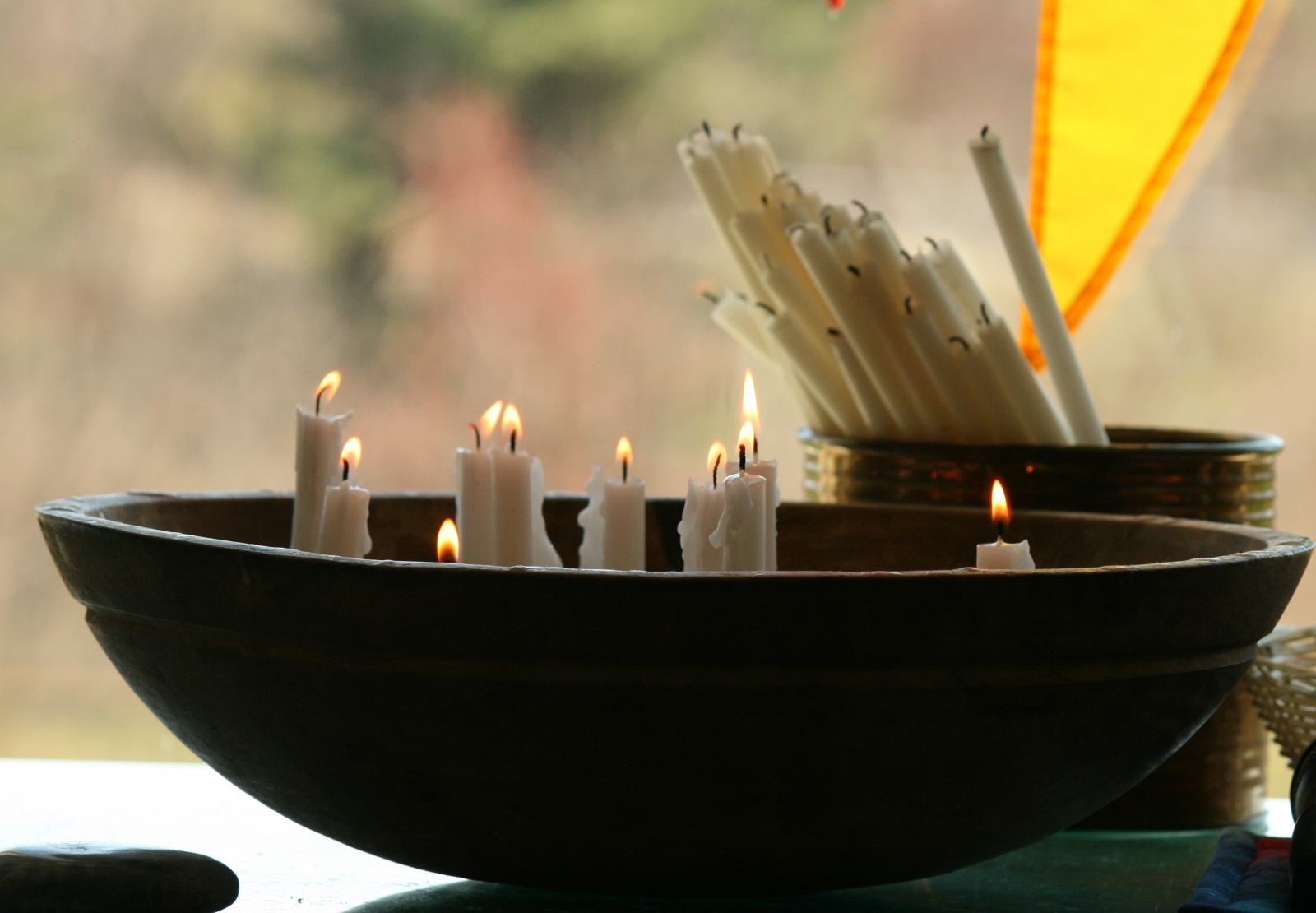
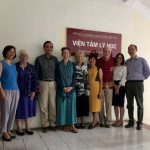 Dr. Hao, Deputy Director of the Institute for Cross-Cultural Psychology, welcomed Ed, Barbara, Song and me with grace and warmth, as we met with three women on the faculty of the Institute . Each of these women had known losses of loved ones in the American War. With Dr. Hao as facilitator, we shared stories of personal history and current perspectives. The stories formed the common thread.
Dr. Hao, Deputy Director of the Institute for Cross-Cultural Psychology, welcomed Ed, Barbara, Song and me with grace and warmth, as we met with three women on the faculty of the Institute . Each of these women had known losses of loved ones in the American War. With Dr. Hao as facilitator, we shared stories of personal history and current perspectives. The stories formed the common thread.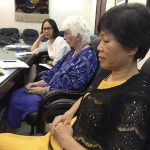 Dr. Hoa practices social psychology with Dr. Hao and is a native of Quang Tri City. In 1970, when she was just seven years old, she lost her father in the American War. He was killed just 10 miles from An Loi, where my first husband, Russ, lost his life two years earlier. In 1973, the relics of her father were found and brought to the war memorials of their village. Their family received from the government a “ticket of morals”. Four members of her grandmother’s family lost their lives in that war. Her grandmother received the title of “Heroine Mother’. Such sacrifice brought honor from their government. Then there was Dr. Huyen, only 40 years old. At the age of five months, she and her three-year-old sister lost their father. It was 1979. He had survived the American War, but not the war of resistance against China, which invaded Viet Nam not long after the end of the American War and which Viet Nam ultimately resisted. Dr. Khanh’s story is more complicated. A half-bother had fought in the American War with the ARVN/American allies in the South) and was killed. Two sisters joined the National Liberation Front (aka Viet Cong). Her father went north and fought with the NVA. “How did you go about loving them,” I asked. “I loved them all,” was her reply.
Dr. Hoa practices social psychology with Dr. Hao and is a native of Quang Tri City. In 1970, when she was just seven years old, she lost her father in the American War. He was killed just 10 miles from An Loi, where my first husband, Russ, lost his life two years earlier. In 1973, the relics of her father were found and brought to the war memorials of their village. Their family received from the government a “ticket of morals”. Four members of her grandmother’s family lost their lives in that war. Her grandmother received the title of “Heroine Mother’. Such sacrifice brought honor from their government. Then there was Dr. Huyen, only 40 years old. At the age of five months, she and her three-year-old sister lost their father. It was 1979. He had survived the American War, but not the war of resistance against China, which invaded Viet Nam not long after the end of the American War and which Viet Nam ultimately resisted. Dr. Khanh’s story is more complicated. A half-bother had fought in the American War with the ARVN/American allies in the South) and was killed. Two sisters joined the National Liberation Front (aka Viet Cong). Her father went north and fought with the NVA. “How did you go about loving them,” I asked. “I loved them all,” was her reply.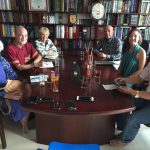 Time for a visit with one of Viet Nam’s most revered poets: Colonel Hung. Yes, he’s a colonel in the Vietnamese army and an internationally celebrated poet in Luc Bat, meaning six-eight. It’s a poetic form of lines alternating between six and eight syllables—or words, since Vietnamese is a monosyllabic language. In each six-eight coupling, the rhyming occurs at the sixth syllable of each line. A bit more challenging than haiku, yes? Song translated for us, and when we asked Colonel Hung to recite (via Song) one of his poems, he offered his poem of the day! Ed then took Song’s translation and morphed it into an English more-or-less Luc Bat form! Also present for this conversation was Thai Minh Chau, a journalist who writes for a women’s magazine and was working with Colonel Hung on a prospective article. I declined to ask why two men were authoring an article for a women’s magazine. Once in a rare while, I choose diplomacy over raised eyebrows!
Time for a visit with one of Viet Nam’s most revered poets: Colonel Hung. Yes, he’s a colonel in the Vietnamese army and an internationally celebrated poet in Luc Bat, meaning six-eight. It’s a poetic form of lines alternating between six and eight syllables—or words, since Vietnamese is a monosyllabic language. In each six-eight coupling, the rhyming occurs at the sixth syllable of each line. A bit more challenging than haiku, yes? Song translated for us, and when we asked Colonel Hung to recite (via Song) one of his poems, he offered his poem of the day! Ed then took Song’s translation and morphed it into an English more-or-less Luc Bat form! Also present for this conversation was Thai Minh Chau, a journalist who writes for a women’s magazine and was working with Colonel Hung on a prospective article. I declined to ask why two men were authoring an article for a women’s magazine. Once in a rare while, I choose diplomacy over raised eyebrows!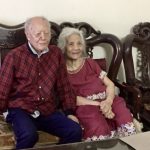 he day was a visit with Huu Ngoc in the home in which he and his wife have lived longer than most of us have been alive. This 100-year-old scholar, linguist, poet, and author of 43 books (working on his last!) greeted us warmly, speaking perfect English and accompanied by his assistant, Nguyen Viet Dung (76 and not too old to be his son!). We sat for well over an hour drinking in the seasoned wisdom of this man fondly known as Thay (revered teacher).
he day was a visit with Huu Ngoc in the home in which he and his wife have lived longer than most of us have been alive. This 100-year-old scholar, linguist, poet, and author of 43 books (working on his last!) greeted us warmly, speaking perfect English and accompanied by his assistant, Nguyen Viet Dung (76 and not too old to be his son!). We sat for well over an hour drinking in the seasoned wisdom of this man fondly known as Thay (revered teacher). 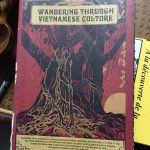 Does Thay have a magnum opus? Perhaps, and it would surely be Wandering Through Vietnamese Culture (2004), a 1200-page tome that delivers far more than its title indicates. After Viet Nam successfully resisted the invasions of Japan, China, France, and America, Huu Ngoc authored a book on that country’s culture as “a means to humanize the former enemy.”
Does Thay have a magnum opus? Perhaps, and it would surely be Wandering Through Vietnamese Culture (2004), a 1200-page tome that delivers far more than its title indicates. After Viet Nam successfully resisted the invasions of Japan, China, France, and America, Huu Ngoc authored a book on that country’s culture as “a means to humanize the former enemy.” 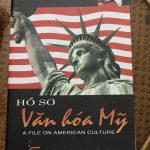 After 1975, for example, he wrote A File on America as a means of facilitating Vietnamese and American friendship. What is America for him? “Idealism and pragmatism.” As for his current perspective on his own country? “Viet Nam is now engaged in its most difficult war, the war to save its own soul.” The materialism that commonly accompanies Western capitalism is undermining values and traditions that have sustained Vietnamese culture for millennia. His counsel for us all? “Look for happiness in the spirit, in serenity.”
After 1975, for example, he wrote A File on America as a means of facilitating Vietnamese and American friendship. What is America for him? “Idealism and pragmatism.” As for his current perspective on his own country? “Viet Nam is now engaged in its most difficult war, the war to save its own soul.” The materialism that commonly accompanies Western capitalism is undermining values and traditions that have sustained Vietnamese culture for millennia. His counsel for us all? “Look for happiness in the spirit, in serenity.”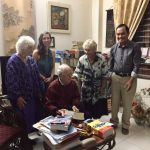 Happiness, serenity, and generosity pour forth from this revered teacher and beloved “lion of literature”, as he is often referred to in Viet Nam. In a nearby pile of books—and books were piled high nearby—were some copies of his newest
Happiness, serenity, and generosity pour forth from this revered teacher and beloved “lion of literature”, as he is often referred to in Viet Nam. In a nearby pile of books—and books were piled high nearby—were some copies of his newest 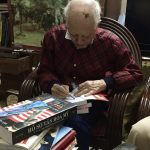 work, Viet Nam: Tradition and Change. Huu Ngoc insisted that we each take a copy as his gift to us, and he graciously inscribed each copy. When I open its pages, I will be sitting again in the sacred space of this man who has stretched minds and opened hearts across history’s vacillation between war and peace, enmity and friendship.
work, Viet Nam: Tradition and Change. Huu Ngoc insisted that we each take a copy as his gift to us, and he graciously inscribed each copy. When I open its pages, I will be sitting again in the sacred space of this man who has stretched minds and opened hearts across history’s vacillation between war and peace, enmity and friendship.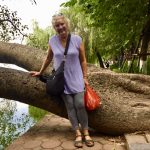 the land that gives life, and the land that gives life nurtures the root structure of the people with whom one lives. This land and its people will live in me for as long as I live.
the land that gives life, and the land that gives life nurtures the root structure of the people with whom one lives. This land and its people will live in me for as long as I live.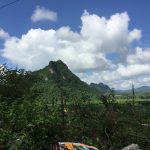 et to this quasi mountain of jagged rocks, where Lynda’s first husband, Peter, was, as Lynda explains, a grunt dropped onto the Rockpile to surveille the VC below not having a clue what he was supposed to do or why. The strategic advantage of the Rockpile was not all that the Marines had built it up to be, and it soon became clear the that the NVA never really wanted to control it, so it was quietly abandoned at the end of 1968. The Rockpile’s original justification was to stop the Ho Chi Minh Trail supply as part of the “McNamara Line”. The intensive defoliation/Agent Orange use along the Ho Chi Minh Trail around the Rockpile led to Peter’s cancer when he returned home.
et to this quasi mountain of jagged rocks, where Lynda’s first husband, Peter, was, as Lynda explains, a grunt dropped onto the Rockpile to surveille the VC below not having a clue what he was supposed to do or why. The strategic advantage of the Rockpile was not all that the Marines had built it up to be, and it soon became clear the that the NVA never really wanted to control it, so it was quietly abandoned at the end of 1968. The Rockpile’s original justification was to stop the Ho Chi Minh Trail supply as part of the “McNamara Line”. The intensive defoliation/Agent Orange use along the Ho Chi Minh Trail around the Rockpile led to Peter’s cancer when he returned home. 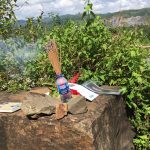 Imagine this outcropping as the backdrop for the ceremony that Lynda led with such grace, and a shelved rock serving as a makeshift altar. Amid song and words spoken from letters written 50 years ago, we placed fresh flowers and sticks of burning incense on the altar, bearing witness and honoring a loved one whose soul was robbed by war and whose body was vulnerable to my nation’s extensive use of Agent Orange.
Imagine this outcropping as the backdrop for the ceremony that Lynda led with such grace, and a shelved rock serving as a makeshift altar. Amid song and words spoken from letters written 50 years ago, we placed fresh flowers and sticks of burning incense on the altar, bearing witness and honoring a loved one whose soul was robbed by war and whose body was vulnerable to my nation’s extensive use of Agent Orange.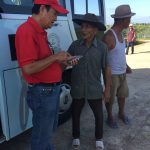 ap. With stalwart perseverance, Song (Tran Dinh Song, our Vietnamese guide), asked the locals. So many hadn’t a clue, until…he connected with an elderly man whose family had lived in Xom An Loi for six generations! Nguyen Van Lanh hopped on his moped and led the busload of us into this tiny hamlet overlooked by the map makers. Lanh knew the exact location we sought.
ap. With stalwart perseverance, Song (Tran Dinh Song, our Vietnamese guide), asked the locals. So many hadn’t a clue, until…he connected with an elderly man whose family had lived in Xom An Loi for six generations! Nguyen Van Lanh hopped on his moped and led the busload of us into this tiny hamlet overlooked by the map makers. Lanh knew the exact location we sought.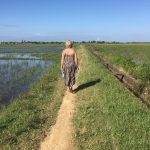 Parking on the outskirts of rice paddies, we saw in the distance a chapel with cross reaching skyward and what appeared to be a cemetery a stone’s throw away. Instinctively I set out solo on the narrow footpaths through the rice
Parking on the outskirts of rice paddies, we saw in the distance a chapel with cross reaching skyward and what appeared to be a cemetery a stone’s throw away. Instinctively I set out solo on the narrow footpaths through the rice 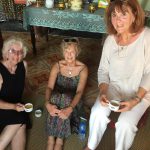 paddies, with my companions close behind. We trekked 4-5 km in afternoon sun that did more than its share on this pilgrimage within a pilgrimage. At last we reached the road linking us to our destination. With the exception of
paddies, with my companions close behind. We trekked 4-5 km in afternoon sun that did more than its share on this pilgrimage within a pilgrimage. At last we reached the road linking us to our destination. With the exception of 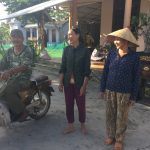 Song and Lanh, we surely appeared as rumpled aliens. Yet a woman with a warm smile and outstretched arms beckoned us to come into her home for rest and refreshment. Family and friends quickly gathered, for we were the first Americans they had seen since the War. Tea and smiles were fuel for the soul.
Song and Lanh, we surely appeared as rumpled aliens. Yet a woman with a warm smile and outstretched arms beckoned us to come into her home for rest and refreshment. Family and friends quickly gathered, for we were the first Americans they had seen since the War. Tea and smiles were fuel for the soul.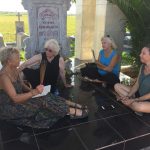 to the deceased. Bearing our sticks of incense and the flowers we had brought, we sat in a circle, and the ceremony that I had planned unfolded. Alas, Ed could not join us, given severe back pain, and Sebastian and Wes had left for home the day before. Except for Song and Lanh, it was a circle of women, including our dear new friend. “Return again, return again, return to the home of your soul,” we sang. I read a poem by Russ,
to the deceased. Bearing our sticks of incense and the flowers we had brought, we sat in a circle, and the ceremony that I had planned unfolded. Alas, Ed could not join us, given severe back pain, and Sebastian and Wes had left for home the day before. Except for Song and Lanh, it was a circle of women, including our dear new friend. “Return again, return again, return to the home of your soul,” we sang. I read a poem by Russ,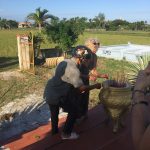 then spoke free-form. I wonder, have you heard “Are you going to Scarborough Fair” with the sotto voce counterpoint? Thank you, Denise, for giving voice to the counterpoint that contrasts the normalcy of going to a fair with lyric shards of war’s realities. We placed flowers and incense on an altar, with Lanh and the woman who had hosted us for tea joining us as family.
then spoke free-form. I wonder, have you heard “Are you going to Scarborough Fair” with the sotto voce counterpoint? Thank you, Denise, for giving voice to the counterpoint that contrasts the normalcy of going to a fair with lyric shards of war’s realities. We placed flowers and incense on an altar, with Lanh and the woman who had hosted us for tea joining us as family.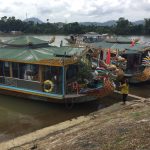 the Buddhist monk Thich Quang Duc (who, in protest against the Diem regime, had
the Buddhist monk Thich Quang Duc (who, in protest against the Diem regime, had 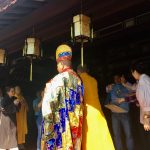 immolated himself at an intersection in Saigon in June 1963). At his pagoda on this glorious day of November 2018, priests chanted and released a host of caged sparrows, freeing also the souls of loved ones. Back in our boat, we
immolated himself at an intersection in Saigon in June 1963). At his pagoda on this glorious day of November 2018, priests chanted and released a host of caged sparrows, freeing also the souls of loved ones. Back in our boat, we 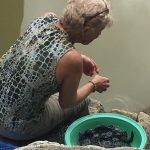 headed further down river to the Taoist Hon Chen Temple honoring Po Nagar, goddess of the ancient Cham minority. As we began to mount the steps to her altar, we were waylaid by women holding up baskets of squirming fish for sale. What were we to do with these fish? Release them into the waters of the river and free the souls of loved ones in need of freeing, on the other side or on this side. So we did.
headed further down river to the Taoist Hon Chen Temple honoring Po Nagar, goddess of the ancient Cham minority. As we began to mount the steps to her altar, we were waylaid by women holding up baskets of squirming fish for sale. What were we to do with these fish? Release them into the waters of the river and free the souls of loved ones in need of freeing, on the other side or on this side. So we did.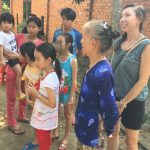 an appeared, motioning them to come to her home for tea. How to believe that the same men who had been on “the other side” were now warmly welcomed by this woman whose brother had fought and died on that side? Witness Madame Ky and her beautiful family, now welcoming us. Such is the nature of the Vietnamese toward Americans ready to experience such grace.
an appeared, motioning them to come to her home for tea. How to believe that the same men who had been on “the other side” were now warmly welcomed by this woman whose brother had fought and died on that side? Witness Madame Ky and her beautiful family, now welcoming us. Such is the nature of the Vietnamese toward Americans ready to experience such grace.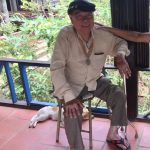 his family compound on the banks of a tributary of the Mekong River. Land laid waste by American bombs has been brought back to life by Tam Tien, his family, and Mama Nature and has become Song Tien. While luxuries are sparse, hospitality is abundant and the evidence of well-knit family is pervasive. With Tam Tien and one another, we dined every night in a gazebo on
his family compound on the banks of a tributary of the Mekong River. Land laid waste by American bombs has been brought back to life by Tam Tien, his family, and Mama Nature and has become Song Tien. While luxuries are sparse, hospitality is abundant and the evidence of well-knit family is pervasive. With Tam Tien and one another, we dined every night in a gazebo on 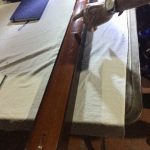 cuisine that spanned elephant ear fish and rice to fresh mangos and dragon eyes (think lychee nuts) and above all, captivating conversation and more. Imagine an evening that held a concert of folk artists dancing, singing, and performing on instruments that included this one-string specimen!
cuisine that spanned elephant ear fish and rice to fresh mangos and dragon eyes (think lychee nuts) and above all, captivating conversation and more. Imagine an evening that held a concert of folk artists dancing, singing, and performing on instruments that included this one-string specimen!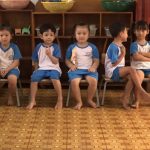 art—and the focus of my photography! Witness a moment of our visit to the kindergarten built by Soldier’s Heart contributions, not far from Song Tien. These little ones are becoming adept in English as well as the wisdom of kindness from the outset.
art—and the focus of my photography! Witness a moment of our visit to the kindergarten built by Soldier’s Heart contributions, not far from Song Tien. These little ones are becoming adept in English as well as the wisdom of kindness from the outset.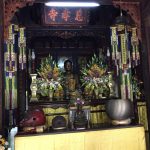 All Wars”. Our group held a circle ceremony of sharing, prayer, reflection, and incense at an altar in the pagoda (home compound) of Thich Nhat Hanh, on the banks of the Perfume River near Hue. May all who died in that war now be at peace. In the customs of the Vietnamese, they would no longer be recognized at the family altar, for after 100 years (4-5 generations), their souls would have entered new beings.
All Wars”. Our group held a circle ceremony of sharing, prayer, reflection, and incense at an altar in the pagoda (home compound) of Thich Nhat Hanh, on the banks of the Perfume River near Hue. May all who died in that war now be at peace. In the customs of the Vietnamese, they would no longer be recognized at the family altar, for after 100 years (4-5 generations), their souls would have entered new beings.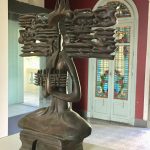 h the non-stop moped traffic to arrive at this magnificent structure that houses Vietnamese art primarily from the past 75 years. Especially striking were sculptures by women of women who took up the weapons of war in defense of their homeland. I was mesmerized by this sculpture titled simply “Spirituality.”
h the non-stop moped traffic to arrive at this magnificent structure that houses Vietnamese art primarily from the past 75 years. Especially striking were sculptures by women of women who took up the weapons of war in defense of their homeland. I was mesmerized by this sculpture titled simply “Spirituality.”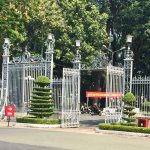 It is where South Vietnamese President Thieu conceded defeat, and helicopters lifted off the roof with hundreds of Americans and those who fought with them on board or literally clawing to get on board. Then to the War Remnants Museum, with sectors devoted to the international peace movement, the storied images of international journalists, and photogra
It is where South Vietnamese President Thieu conceded defeat, and helicopters lifted off the roof with hundreds of Americans and those who fought with them on board or literally clawing to get on board. Then to the War Remnants Museum, with sectors devoted to the international peace movement, the storied images of international journalists, and photogra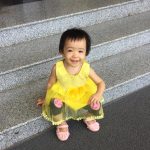 phs bearing the horrific evidence of Agent Orange—with pictures drawn and painted by “Agent Orange children”. Upon exiting this hall of powerful memory, I was graced by the appearance of this adorable child, dancing and cavorting and ready to play. May she embody our collective future?
phs bearing the horrific evidence of Agent Orange—with pictures drawn and painted by “Agent Orange children”. Upon exiting this hall of powerful memory, I was graced by the appearance of this adorable child, dancing and cavorting and ready to play. May she embody our collective future?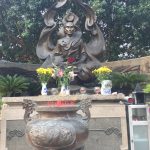 single photograph of this act was seen around the world and marked a turning point in Diem’s inept and brutal leadership, fully supported by our country’s leaders, including JFK, until it met enough resistance that he was assassinated by his own people in early November 1963, with the covert support of the Kennedy administration. JFK had begun to question U.S. policy in Viet Nam; it was perhaps no coincidence that he was assassinated just weeks after Diem’s demise.
single photograph of this act was seen around the world and marked a turning point in Diem’s inept and brutal leadership, fully supported by our country’s leaders, including JFK, until it met enough resistance that he was assassinated by his own people in early November 1963, with the covert support of the Kennedy administration. JFK had begun to question U.S. policy in Viet Nam; it was perhaps no coincidence that he was assassinated just weeks after Diem’s demise.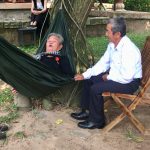 onounced me as her “big sister”, an honor in Vietnamese culture. Then a Then a gift to us: she and her husband “performed” in song and then asked me to sing for them. I did: “Come sing a song with me, come sing a song with me…that I might know your mind. And I’ll bring you hope, when hope is hard to find…” Know that we are finding it anew here in Viet Nam.
onounced me as her “big sister”, an honor in Vietnamese culture. Then a Then a gift to us: she and her husband “performed” in song and then asked me to sing for them. I did: “Come sing a song with me, come sing a song with me…that I might know your mind. And I’ll bring you hope, when hope is hard to find…” Know that we are finding it anew here in Viet Nam.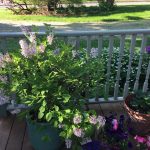 As for yesterday: Breakfast at Brew Bakers with Dan, off to JC Farms in Durham to purchase plantings for yard and garden, and pausing to inhale the late blooming lilacs gracing planters on our back porch. As for the remainder of the day, I could not not (double negative intentional) participate in the third weekly witness of the Poor People’s Campaign, a multi-issue campaign begun by Dr. King and cut short by his assassination 50 years ago. It’s been reinvigorated by Rev. William Barber, familiar to many of us through his founding of the Moral Monday movement, and launched here in CT by Bishop John and Lady Pamela Selders in conjunction with Moral Monday CT.
As for yesterday: Breakfast at Brew Bakers with Dan, off to JC Farms in Durham to purchase plantings for yard and garden, and pausing to inhale the late blooming lilacs gracing planters on our back porch. As for the remainder of the day, I could not not (double negative intentional) participate in the third weekly witness of the Poor People’s Campaign, a multi-issue campaign begun by Dr. King and cut short by his assassination 50 years ago. It’s been reinvigorated by Rev. William Barber, familiar to many of us through his founding of the Moral Monday movement, and launched here in CT by Bishop John and Lady Pamela Selders in conjunction with Moral Monday CT. 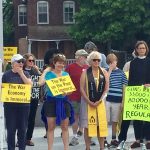 Off I went to Hartford to join the Selders, Ann Pratt (DUE Justice Coalition), congregants Steve Volpini and Diane Szymaszek, colleague Rev. Josh Pawalek, and so many other friends and allies for this week’s witness—resisting the increasing militarism and runaway gun violence of our nation. I knew it was time once again to put myself on the line and be arrested. So I was, along with four others “standing our ground” in the street in front of our Capitol. Yes, your minister was once again in the slammer for a few hours. Court date is June 14, with three days of community service likely this summer.
Off I went to Hartford to join the Selders, Ann Pratt (DUE Justice Coalition), congregants Steve Volpini and Diane Szymaszek, colleague Rev. Josh Pawalek, and so many other friends and allies for this week’s witness—resisting the increasing militarism and runaway gun violence of our nation. I knew it was time once again to put myself on the line and be arrested. So I was, along with four others “standing our ground” in the street in front of our Capitol. Yes, your minister was once again in the slammer for a few hours. Court date is June 14, with three days of community service likely this summer.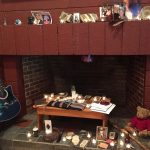 Witness the altar we created on the first evening, made sacred by the artifacts that represented our experiences of memory and loss. Two of the three items I brought are regularly in my study at church. Come see me when I return next Tuesday, and I’ll show you what and why they are. Then…so much deep sharing, who we are, why we were there, “sharing our stories from deep inside” (I introduced them to the song), laughter and tears and meditation and walks in the woods, and budding friendships. Sunday evening brought a simulated sweat lodge in the sauna, with chanting. (No photos here!) For a rather long hour and in the company of mostly women, I sweat and chanted and laughed and shouted and cried and let it all out! Amazing grace it was, the entire weekend.
Witness the altar we created on the first evening, made sacred by the artifacts that represented our experiences of memory and loss. Two of the three items I brought are regularly in my study at church. Come see me when I return next Tuesday, and I’ll show you what and why they are. Then…so much deep sharing, who we are, why we were there, “sharing our stories from deep inside” (I introduced them to the song), laughter and tears and meditation and walks in the woods, and budding friendships. Sunday evening brought a simulated sweat lodge in the sauna, with chanting. (No photos here!) For a rather long hour and in the company of mostly women, I sweat and chanted and laughed and shouted and cried and let it all out! Amazing grace it was, the entire weekend.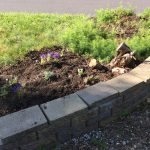 and today will pot and plant some of those aromatic items I purchased yesterday and later get my stitches out. What?? Okay, a few weeks ago I was taking the wheelbarrow out of the garage and not paying attention to exactly where I was. That bothersome metal device through which the garage door slides on the inside wall got in my way, and did a number on my left forearm. Off to the ER and 11 stitches. A raw lesson in paying attention.
and today will pot and plant some of those aromatic items I purchased yesterday and later get my stitches out. What?? Okay, a few weeks ago I was taking the wheelbarrow out of the garage and not paying attention to exactly where I was. That bothersome metal device through which the garage door slides on the inside wall got in my way, and did a number on my left forearm. Off to the ER and 11 stitches. A raw lesson in paying attention. visit to Vermont to celebrate grandson Forrest’s 8th H
visit to Vermont to celebrate grandson Forrest’s 8th H appy Birthday and a birthday party with his friends at a water park (indoors, thank you, we’re not completely crazy!). After a FULL day of water park fun, what was Forrest’s next move on arriving home: “Let’s go play soccer in the backyard, GramJan!”
appy Birthday and a birthday party with his friends at a water park (indoors, thank you, we’re not completely crazy!). After a FULL day of water park fun, what was Forrest’s next move on arriving home: “Let’s go play soccer in the backyard, GramJan!”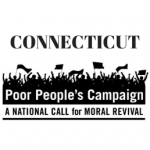 in the launching of the new Poor People’s Campaign. Yes, to all of you who marched this Monday in Hartford. Yes, to all who marched in over 30 capital cities across the country. And Amen, to the words of Rev. Dr. William Barber, who has taken the torch from 50 years ago and stands at the helm of this campaign: “We cannot continue to have a democracy that engages in the kind of policy violence that we see happening every day.” And Amen to our faith’s fifth principle, which bids us to affirm and promote “the right of conscience and the use of the democratic process within our congregations and in society at large”.
in the launching of the new Poor People’s Campaign. Yes, to all of you who marched this Monday in Hartford. Yes, to all who marched in over 30 capital cities across the country. And Amen, to the words of Rev. Dr. William Barber, who has taken the torch from 50 years ago and stands at the helm of this campaign: “We cannot continue to have a democracy that engages in the kind of policy violence that we see happening every day.” And Amen to our faith’s fifth principle, which bids us to affirm and promote “the right of conscience and the use of the democratic process within our congregations and in society at large”. e the final lines of William Wordsworth’s “I wandered lonely as a cloud” that holds the poignantly poetic meditation inspired by these seasonal blossoms. As for seasonal, ‘tis the season for a 40th Annual Daffodil Festival at which I know a host of daffodil lovers of all ages are volunteering, and a favorite destination has surely been a booth where my favorite FUNdraisers are selling mouth-watering grilled cheese sandwiches, tummy warming tomato soup, thirst-quenching lime rickeys, and hot chocolate as a liquid dessert! Hopefully hundreds if not thousands of festival attendees stood in line, eager to order, no matter how long the wait. After dancing with daffodils and mulling over the crafts and more lining the aisles of the mega-tent, it was time to indulge!
e the final lines of William Wordsworth’s “I wandered lonely as a cloud” that holds the poignantly poetic meditation inspired by these seasonal blossoms. As for seasonal, ‘tis the season for a 40th Annual Daffodil Festival at which I know a host of daffodil lovers of all ages are volunteering, and a favorite destination has surely been a booth where my favorite FUNdraisers are selling mouth-watering grilled cheese sandwiches, tummy warming tomato soup, thirst-quenching lime rickeys, and hot chocolate as a liquid dessert! Hopefully hundreds if not thousands of festival attendees stood in line, eager to order, no matter how long the wait. After dancing with daffodils and mulling over the crafts and more lining the aisles of the mega-tent, it was time to indulge!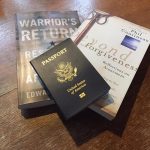 As I conclude Ed Tick’s most recent work, Warrior’s Return: Restoring the Soul After War, I am about to open the pages of beyond forgiveness: Reflections on Atonement, an anthology of writings that includes the work of Ed, Kate Dahlstedt (his wife and co-founder of Soldier’s Heart), Rabbi Michael Lerner, Arun Gandhi, and others who have walked this path.
As I conclude Ed Tick’s most recent work, Warrior’s Return: Restoring the Soul After War, I am about to open the pages of beyond forgiveness: Reflections on Atonement, an anthology of writings that includes the work of Ed, Kate Dahlstedt (his wife and co-founder of Soldier’s Heart), Rabbi Michael Lerner, Arun Gandhi, and others who have walked this path.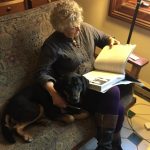 al is making possible. As for reading, I have a companion, a muse you might call him. Pablo at his most tranquil curls up beside me, head sometimes in my lap, but not so much that I can’t turn the pages of this particularly sizable tome, Geoffrey C. Ward’s and Ken Burns’ The Vietnam War, a good ten pounds and a scholarly emotive opus that speaks to heart and mind. I read a chapter, then view with husband Dan the corresponding episode in the Ken Burn’s and Lyn Novick’s ten-part video series. This is personal affirmation of those words of trauma therapist and co-leader of my autumn pilgrimage to Vietnam: “Wars do not end when we say they are over.”
al is making possible. As for reading, I have a companion, a muse you might call him. Pablo at his most tranquil curls up beside me, head sometimes in my lap, but not so much that I can’t turn the pages of this particularly sizable tome, Geoffrey C. Ward’s and Ken Burns’ The Vietnam War, a good ten pounds and a scholarly emotive opus that speaks to heart and mind. I read a chapter, then view with husband Dan the corresponding episode in the Ken Burn’s and Lyn Novick’s ten-part video series. This is personal affirmation of those words of trauma therapist and co-leader of my autumn pilgrimage to Vietnam: “Wars do not end when we say they are over.”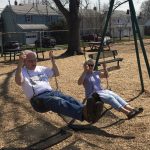 Specifically, a swing in the playground of granddaughter Sophie’s school in Glen Ridge with my ever lovin’ spouse? This past weekend Dan and I headed south to New Jersey to see daughter Lisa and husband Rob and Ollie (10) and Sophie (6) but also to reconnect with my home church, the Unitarian Universalist Congregation at Montclair, for a series of celebrations. Revs. Any and Scott Sammler-Michael were installed as co-ministers! A concert that rocked the rafters the evening before, followed by dinner with longtime friends, was prologue to Installation Day, this past Sunday. Here are Revs. Any and Scott
Specifically, a swing in the playground of granddaughter Sophie’s school in Glen Ridge with my ever lovin’ spouse? This past weekend Dan and I headed south to New Jersey to see daughter Lisa and husband Rob and Ollie (10) and Sophie (6) but also to reconnect with my home church, the Unitarian Universalist Congregation at Montclair, for a series of celebrations. Revs. Any and Scott Sammler-Michael were installed as co-ministers! A concert that rocked the rafters the evening before, followed by dinner with longtime friends, was prologue to Installation Day, this past Sunday. Here are Revs. Any and Scott 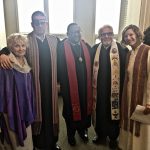 along with UUCM’s (yes, Montclair and Meriden UU congregations have the same acronym) Minister Emeritus Rev. Charlie Blustein Ortman, along with friend and colleague Rev. John Crestwell. Such were reconnection and renewal in this sacred space in which so much of my UU history was formed!
along with UUCM’s (yes, Montclair and Meriden UU congregations have the same acronym) Minister Emeritus Rev. Charlie Blustein Ortman, along with friend and colleague Rev. John Crestwell. Such were reconnection and renewal in this sacred space in which so much of my UU history was formed!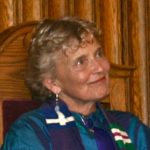 Today, March 8, is International Women’s Day. As Unitarian Universalists, we draw on many sources of truth and meaning, including the words and deeds of prophetic women and men. Today, we celebrate the words and deeds of prophetic women, many of them in our own time.
Today, March 8, is International Women’s Day. As Unitarian Universalists, we draw on many sources of truth and meaning, including the words and deeds of prophetic women and men. Today, we celebrate the words and deeds of prophetic women, many of them in our own time.